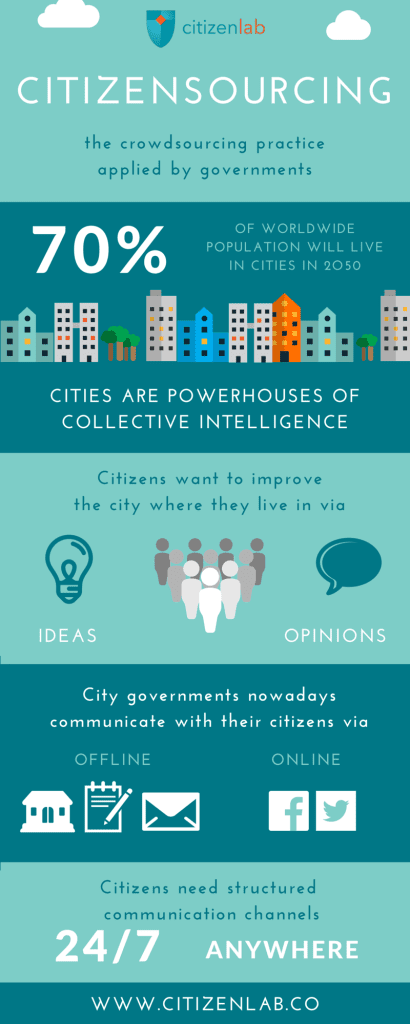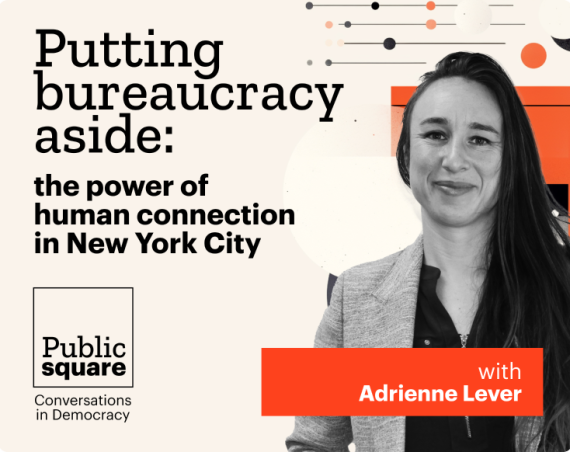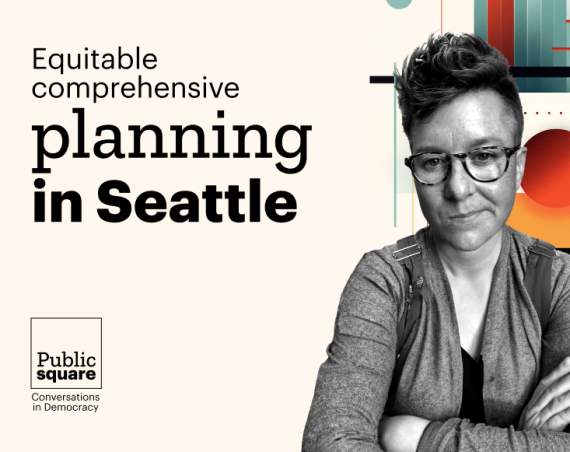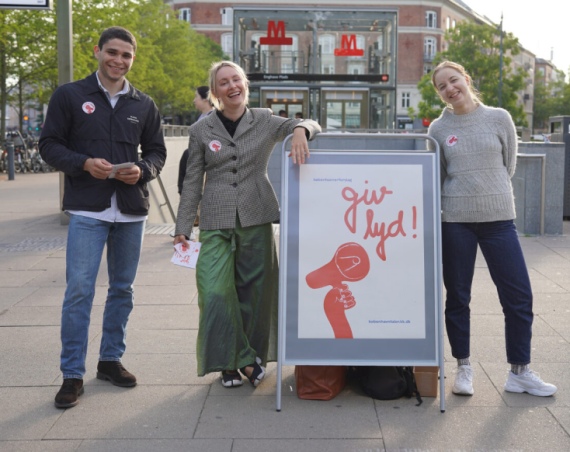Everybody has heard of crowdsourcing, the practice of engaging a ‘crowd’ or group for a common goal — often innovation, problem solving, or efficiency. Thanks to the modern web and its growing connectivity, it’s now easier than ever for individuals to collectively contribute. The Internet and social media have brought organizations closer to their stakeholders, laying the groundwork for new ways of collaborating and creating value together like never before – of which citizensourcing is the best example.
Citizensourcing
Citizensourcing is the crowdsourcing practice applied by governments with the goal of tapping into the collective intelligence of the citizens. Through citizensourcing, governments can collect ideas, suggestions and opinions from their citizens — thereby creating a permanent feedback loop of communication.
Cities are a powerhouse of collective intelligence. Thanks to modern technologies, time has come to unlock the wisdom of the crowd.
Yesterday
The current means of engaging citizens in public policy are in place since the 18th century: town hall meetings, in-person visits, phone calls or bureaucratic forms that allowed you to submit an idea. All of those ways of engagement are time-consuming, ineffective and expensive.
Great ideas and valuable feedback get lost, because those forms of engagement take too much effort for both citizens and cities. And next to that, communication happens in private between city government and citizens. Citizens cannot communicate with each other about how they want to improve their city.
Today
Advances in technology have restructured the way societies are organised; we’re living a digital age in which citizens are connected over networks. This creates unseen opportunities for cities to get closer to their citizens and serve them better. In the last years, we’ve seen several cities trying to build a strong online presence on social media channels.
Yet, they have discovered that communicating with their citizens over Twitter and Facebook is far from optimal. Messages get lost in the information overload that characterises those platforms, resulting in a lack of structured communication.
Tomorrow
Imagine that your town hall meetings could be held online… but then 24/7, accessible from every possible device. Citizensourcing on a dedicated platform is an inexpensive way for cities to get valuable input in the form of ideas, feedback and opinions from their citizens.
Whereas only a very small proportion of citizens engage in the time-consuming offline participation, an online platform allows you to multiply your reach by tenfolds. You reach an audience of citizens that you couldn’t reach before, which makes an online platform a well-needed complement for the already existing offline channels in every city.
When citizens can share their ideas in an easy and fun way and get rewarded for their valuable input, that’s when the wisdom of the crowd gets truly unlocked.
The most direct benefit for cities is clear: crowdsourcing new urban ideas drives superior innovations. At least as important as the fact that you offer a new channel for proposals, is that engagement leads to a better understanding of the different needs citizens have.

And yes, it works
Luckily, we see more and more cities leveraging technology to co-create with their citizens. Whereas crowdsourcing has been successfully by several companies (world’s biggest companies like Coca-Cola, Eli Lilly, Unilever and P&G apply crowdsourcing extensively), citizensourcing is still waiting for mass adoption by cities. There are several early success stories that show the gigantic potential though:
- The Colombian city Medellín has its own crowdsourcing platform MiMedellín on which citizens share their urban solutions for problems the city faces. It turned out to be a big success: having collected more than 2,300 (!) posted ideas, the government is already developing policies with help from the creativity of citizens.
- In the Icelandic capital, Reykjavik, the city council succeeded in having their citizensourcing website Better Reykjavik used by over 60% of the citizens. Since Reykjavik implemented their city platform, they have spent €1.9 million on developing more than 200 projects based on ideas from citizens.

The citizens of Paris voted massively for vertical gardens in their city. - Paris held a participatory budgeting process, called ‘Madame Mayor, I have an idea’, that brought forward wonderful proejcts. To name one, after having received well over 20,000 votes, the city government announced to invest €2 million in vertical garden projects. Other popular ideas included gardens in schools, neighbourhood recycling centers and co-working spaces for students and entrepreneurs.
About CitizenLab
CitizenLab wants to help your city with tapping into citizen brainpower in order to create similar success stories. Our citizensourcing software is designed in a way that makes it easy and rewarding for your citizens to co-create their city, which leads to a maximum online civic engagement. CitizenLab allows you thereby to keep track of your citizens’ engagement and to reward them accordingly.
Wanted: your city
We are currently looking for partner cities to roll out pilot projects. In case your city could be interested, click here to ask for more information. We’ll get back to you in max. 4-5 hours.





